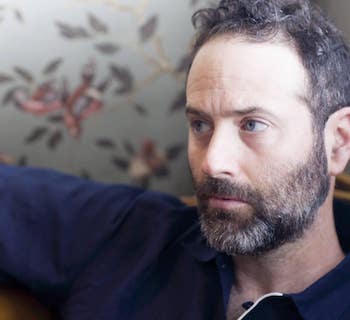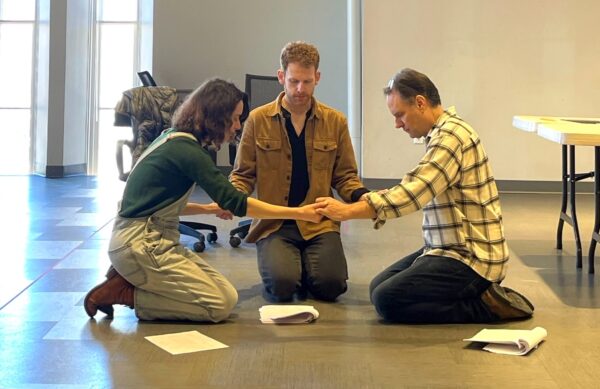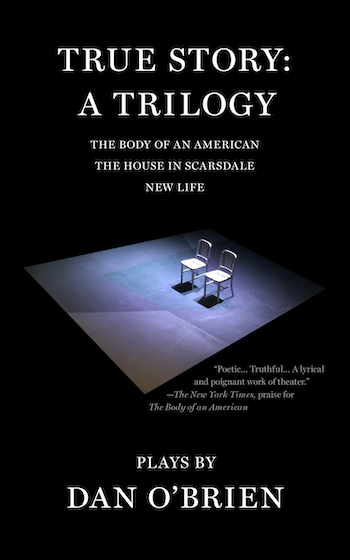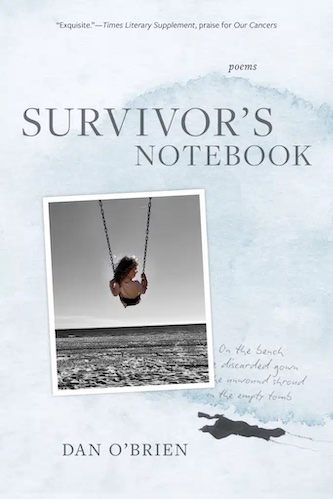Theater Interview/Preview: Dan O’Brien — The Playwright as Documentarian
By David DeWitt
It’s not hyperbole to suggest that True Story: A Trilogy represents a distinctive achievement in theater history.

Playwright-poet-memoirist Dan O’Brien. Photo: Cambridge Jones
As playwright-poet-memoirist Dan O’Brien has been preparing for the opening of his new drama, Newtown (previews begin on April 16 for its April 20 premiere at Geva Theatre in Rochester, NY), he’s been grappling with mortality in a way he hadn’t foreseen, learning in November that the death of his oldest brother, Chris, in February 2023 was actually a suicide. For the past few months he’s been holding these two tragedies close: the murders of 20 first-graders and six staff members at Sandy Hook Elementary School in Newtown, Connecticut, and the culmination of his troubled sibling’s life.
But O’Brien has been living with real-life darkness for quite a while. He was commissioned to write about guns in America by the Oregon Shakespeare Festival. O’Brien chose to focus on the then-recent 2012 Sandy Hook killings, an event that has accumulated an archetypal power in our national consciousness during America’s plague of mass shootings. It was a bold and intimidating theatrical project — he set it aside after a couple of years of research. Then the 2018 Parkland, Florida, high school shootings triggered him to pick up the idea again.
O’Brien has also been busy, to put it mildly, all this decade with other true-life tales. Among them were five lauded collections of poetry: War Reporter (2013), Scarsdale (2014), New Life (2015), Our Cancers (2021), and Survivor’s Notebook (2023), the last four of them focusing on events in his own life. In 2021 he also published a book of personal essays, A Story That Happens: On Playwriting, Childhood, & Other Traumas, that divulged more of that life. The collection, in a somewhat scholarly mode, anticipated his 2023 prose memoir, From Scarsdale: A Childhood (Dalkey Archive Press). There he became much more explicit about his dysfunctional and emotionally abusive childhood (including his brother’s first suicide attempt, as a teenager) in Scarsdale, New York, and what O’Brien calls his troubled parents’ disownment of him just before his 2006 wedding to actress Jessica St. Clair.
Amid all that activity, there was the trilogy of plays, all featuring characters explicitly named Dan and excavating the writer’s early personal traumas: The Body of an American (which premiered in 2012), The House in Scarsdale: A Memoir for the Stage (2017), and New Life (which had Covid-era readings but, as of yet, no premiere). Each is part of the collection True Story: A Trilogy, released just as 2023 ended.
I asked some fellow critics (I once reviewed for the New York Times) if they could remember another playwright who’d been so extensively, prolifically, and overtly autobiographical. None of us could.
Is it more than coincidental that this fertile period came with the birth of O’Brien’s daughter in 2013? And, just to keep the decade especially fecund and fraught, O’Brien was also diagnosed with colon cancer in 2016, just months after he learned St. Clair had breast cancer. Both survived, and their cancer tales became an inspiration for his art as well. So had O’Brien’s unlikely friendship with Paul Watson, a Pulitzer-winning war photographer. Watson’s career motivated O’Brien to write a couple of plays, a book of poetry, and the libretto for the chamber opera The War Reporter (directed by the estimable Rinde Eckert). Paul, O’Brien acknowledges, becomes a surrogate for his brother Chris, the one who recently took his own life; in fact, Chris is given the pseudonym of Paul in O’Brien’s plays and memoir.
That memoir, partly written during his cancer treatment, was “in many ways the work of my entire writing life,” O’Brien said. “I wanted to sum up that story for myself and my daughter before I ran out of time.” Perhaps the same can be said for all the many works he produced during this period.
In a recent Zoom chat, O’Brien appeared healthy, voluble, and chipper, plainly excited about the Newtown premiere. I wondered if he were exhausted. Instead, O’Brien responded, “Writing [these works] served to make me feel, magically, that I wasn’t unwell.”
Visiting Newtown

Jonathan Walker as Matthew (the Peter Lanza character); Max Chernin as Ethan (the Robbie Parker character); Kate Abbruzzese as Naomi (the Alissa Parker character) during a Geva rehearsal of Newtown. Photo: Dan O’Brien
Newtown, a largely psychological study of the nature of denial and forgiveness, is a shift from his own life as material — “I am again writing fictionally,” he says in the introduction to True Story: A Trilogy — though the new work, he acknowledges, retains the feel and sourcing of documentary.
The intimate, brittle play, directed at Geva by the theater’s artistic director, Elizabeth Williamson, begins with a harrowing first act as a mother (Kellie Overbey) speaks with intermittent desperation to her sullen, withdrawn son. It’s a portrait based on Nancy Lanza, the mother, caregiver, and deceased victim of Adam Lanza, the Sandy Hook murderer. The second act brings in a character (Jonathan Walker) based on Adam’s father, Peter, as he meets with the parents (Max Chernin and Kate Abbruzzese) of one of the deceased schoolchildren. In O’Brien’s words, the first act focuses on what took place before the tragedy; the second act, the aftermath.
“Will enough actors or the right actors want to do this show because it’s so intense and dark?,” O’Brien wondered in the interview. “It was important for me in casting the play to find all four actors who could be vulnerable.”
Newtown is based on fact — not just the backdrop of the shootings themselves, but also Nancy and Adam’s recorded home life and the documented meeting between Peter Lanza and the parents (Alissa and Robbie Parker) of Emilie, a victim. The meeting was mentioned in Alissa Parker’s 2017 book An Unseen Angel: A Mother’s Story of Faith, Hope, and Healing After Sandy Hook, and Lanza discussed it, along with his divorce from Nancy before the murders, in a 2014 New Yorker interview. Nonetheless, O’Brien describes Newtown as fiction because he doesn’t use real names and the stage conversations are imagined.
O’Brien hasn’t entirely brushed off his own past, though, acknowledging that his rendering of the shooter’s mother has similarities with his own, a woman he’s described as probably having borderline personality disorder.
Wherever he takes his multifaceted career hereafter — the Middlebury and Brown graduate only recently turned 50 — the plays in True Story: A Trilogy and the works written around them represent pioneering, direct efforts to infuse personal revelations into a compelling theatrical form. O’Brien told me that in his youth he was “enamored with the confessional poets,” such as Sylvia Plath: “I felt they saved my life.” Now he has a decade of some nine or 10 works in a similar vein, all “writing in reaction to denial,” he said.
In A Story That Happens, O’Brien wrote that a playwright should be dedicated to creating work that confronts audiences with the “unspoken…. So we listen for what is unspoken in our culture, and it won’t be what our culture wants to hear. But we use our art to make them hear it. They will disagree, because they see things differently; because they don’t know yet how they feel; because they don’t want to feel.”
True Story: A Trilogy
 The Body of an American, the trilogy’s first play, was conceived to use O’Brien as a narrator in what would be “a gonzo piece of journalism,” the dramatist said. But that aim shifted as his own presence in the play became stronger.
The Body of an American, the trilogy’s first play, was conceived to use O’Brien as a narrator in what would be “a gonzo piece of journalism,” the dramatist said. But that aim shifted as his own presence in the play became stronger.
The title figure of the play, which O’Brien acknowledges on its title page was inspired by Watson’s memoir Where War Lives, is US Staff Sgt. William David Cleveland, whom Watson photographed in 1993 as a corpse and victim of a Somali mob. (The picture won him a Pulitzer Prize.) Watson felt haunted by what he believed were Cleveland’s last words; he heard the dead man say, “If you do this, I will own you forever.”
O’Brien heard Watson’s story in an NPR interview and felt he had a mysterious connection with the man. Instead of moving past his instinct, he sought out Watson by email. Improbably, Watson responded, and that connection led the two to exchange tales of their separate traumas, both explored in the script. The play depicts their interactions, mostly virtually but eventually in person when O’Brien visits Watson’s new base in the Arctic. As O’Brien later realized, “Paul was — psychologically — a stand-in for my brother,” Chris. In fact, he added, “I was trying to fix my brother in Paul.”
Dan, Paul, and all the other roles in The Body of an American are portrayed by two actors. One plays Paul and the other plays Dan, though they are also called to take on the roles of the play’s other characters and, sometimes, switch protagonists. (This approach worked beautifully in the Hartford production I reviewed, directed by Jo Bonney and featuring the excellent Michael Crane and Michael Cumpsty.)
O’Brien continues this flexible theatricality in The House in Scarsdale and New Life. The use of two actors is remarkably malleable (if at times difficult to read). The overall effect is naturalistic, though in spots it’s Brechtian or, elsewhere, perhaps impressionistic. Yet the sense of realism is strong, despite another “strange” (O’Brien’s word) feature of these plays: they’re all written in verse, though most audience members won’t notice. Newtown is also written in verse, though, he noted, he’s now moving away from that technique.
Perhaps in part because of O’Brien’s risky deep dive into his past, The Body of an American won the Horton Foote Prize for Outstanding New American Play, as well as a share of the inaugural Edward M. Kennedy Prize for Drama with Robert Schenkkan’s portrait of Lyndon Johnson, All the Way. As well as a compelling rendering of Watson, O’Brien lays bare his own inner life in this play, most memorably in a lengthy monologue that details his traumatic childhood. I found this speech stunningly perilous, and exciting, when I saw the Hartford Stage production; I felt taboos were being broken. Many playwrights draw on their personal pain, but they tend to disguise it. Not O’Brien, not here.
Still, I couldn’t have guessed he’d up that game with The House in Scarsdale. Here the Dan character is played by two actors, who also undertake many other roles, including his mother, father, now-deceased brother, other relatives, wife, and uncle (who seems suspiciously likely to be Dan’s biological father, a conjecture left uncertain at play’s end).
The House in Scarsdale, which won the PEN America award for drama, lays out Dan’s quest to uncover the mysteries of his family in the wake of his sudden separation from them. “I was cut out without explanation,” O’Brien said.
 He approached the play’s research as a journalist, he told me, though “that was terrifying for me, to contact relatives.” The script contains some theatrically dangerous moments, such as a raw and merciless fight between Dan and his wife, here called her real name, Jess. (The audience might wonder: How revealing are we going to get?) The drama’s suspense builds to Dan’s final discoveries during a meeting with his long-missing uncle, the holder of domestic secrets. The House in Scarsdale is, indeed, a memoir on stage, dramatically energized by detective work dedicated to ferreting out what has remained unspoken.
He approached the play’s research as a journalist, he told me, though “that was terrifying for me, to contact relatives.” The script contains some theatrically dangerous moments, such as a raw and merciless fight between Dan and his wife, here called her real name, Jess. (The audience might wonder: How revealing are we going to get?) The drama’s suspense builds to Dan’s final discoveries during a meeting with his long-missing uncle, the holder of domestic secrets. The House in Scarsdale is, indeed, a memoir on stage, dramatically energized by detective work dedicated to ferreting out what has remained unspoken.
New Life moves into new as well as old territory. The script returns to O’Brien’s friendship with Paul Watson; some of the action revolves around the two envisioning a war-based TV series and then attempting (sometimes hilariously) to sell it to major networks. But mostly the play follows Dan’s difficult journey through his colon cancer diagnosis and treatment, complete with musings on death.
It would be wonderful to see this play produced, mostly to see how its seemingly unwieldy twin focus plays out on stage. Having read O’Brien’s superb poetry collection Our Cancers, I was expecting that he’d be driven to write this play about him, his wife, and their brushes with death. I was only partly right. Nor is he much concerned about his family of origin here. (In real life, O’Brien’s family, the dramatist told me, never contacted him during his treatment.)
What’s next?
Besides Newtown, O’Brien’s multifaceted career will likely take him in several new directions. There’s an upcoming essay about his departed brother, for instance, set for a national magazine, and he’s at work on a new play that he describes as “fun and imaginative.” “I don’t want to go backwards,” O’Brien told me, even though “I don’t believe in quote-unquote closure.”
It’s not hyperbole to suggest that True Story: A Trilogy represents a distinctive achievement in theater history. I recommend O’Brien’s many other autobiographical works — they’re good stuff and add invaluable context to these plays — but True Story: A Trilogy stands on its own as revolutionary, revealing docudrama. “I used to write fictionally,” O’Brien observes in the collection’s introduction; “storytelling was an egress from reality.” But being disowned from his family erased that neat division: “Fiction now seemed frivolous, evasive.” Newtown continues to reflect that mix-and-match sensibility. O’Brien may return to pure fiction next, but with the plays in True Story: A Trilogy, the dramatist/poet expanded the boundaries of the docudrama and memoir.
David DeWitt, now an editor with BioNews, reviewed theater, film and television for the New York Times, as well as books in other publications.
Tagged: "Newtown", "True Story: A Trilogy", Dan O'Brien
